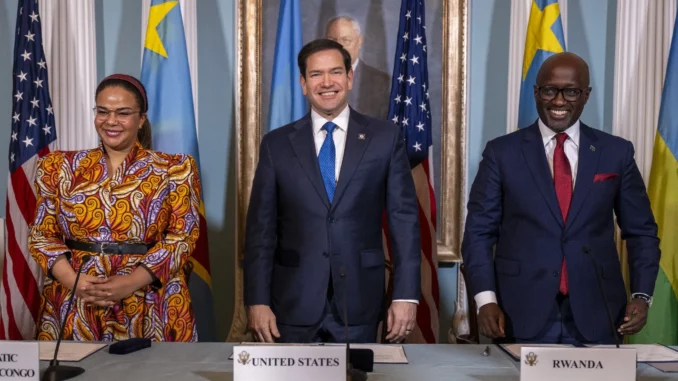
Rwanda and the Democratic Republic of Congo (DRC) are expected to sign a U.S.-brokered agreement on Friday, June 27 in Washington aimed at ending the long-standing conflict in eastern DRC that has claimed thousands of lives.
The deal, to be signed by the foreign ministers of both nations in the presence of Secretary of State Marco Rubio, also includes a scheduled Oval Office meeting with President Donald Trump, who has taken personal credit for the diplomacy. The agreement, mediated with support from Qatar and Trump advisor Massad Boulos, commits both countries to respect territorial integrity, halt hostilities, and disarm non-state armed groups, though the details remain vague.
At the heart of the conflict is the M23 rebel group, which launched a renewed offensive in late 2021, capturing significant territory including the strategic city of Goma. The DRC government accuses Rwanda of backing M23 militarily, a charge Kigali denies. Rwanda, in turn, has demanded the dismantling of the DRC-based Democratic Forces for the Liberation of Rwanda (FDLR), a group it sees as a threat. While the agreement reportedly seeks to balance these demands, including asking the DRC to sever ties with the FDLR, Rwandan officials have denied any provisions requiring withdrawal of their troops, suggesting disagreements remain over the interpretation and enforcement of the terms.
Beyond conflict resolution, the agreement hints at broader economic ambitions, including a future regional summit involving Trump and the presidents of Rwanda and the DRC. The accord also outlines a framework for regional economic integration, aligning with U.S. interests in securing access to the DRC’s vast mineral wealth amid growing competition with China. However, the deal has drawn criticism for its opacity, particularly concerning how peace will be sustained and how economic elements will be implemented. With peace tied to commercial incentives, observers caution that mineral diplomacy must not overshadow accountability and long-term stability in the region.
